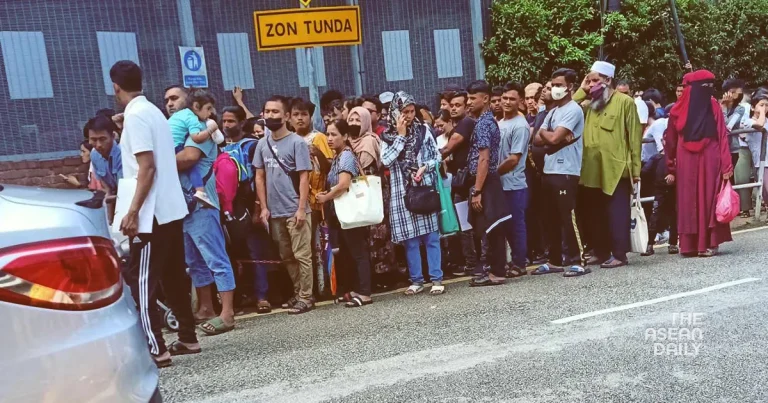15-6-2024 (KUALA LUMPUR) A recent TikTok video has reignited discussions surrounding the contrasting perceptions of Rohingya and Palestinian refugees in Malaysia. In the clip, a Malaysian businessman, Sophian Mohd Zain, delivers a scathing rant, accusing Rohingya refugees of overstaying their welcome and exploiting the country’s resources.
“They came as illegal immigrants, then they stole citizens’ rights,” Sophian asserts, alleging that Rohingya refugees misuse their United Nations Refugee Agency (UNHCR) cards to prolong their stay indefinitely. His comments garnered support from numerous netizens, with one user echoing, “It is because Malaysia enables them.”
A cursory examination of Sophian’s TikTok accounts reveals a pattern of videos criticizing the nation’s immigration situation, with some footage depicting him confronting members of the refugee community in an aggressive manner.
Sophian defends his actions, stating his intention is to raise public awareness about the prolonged presence of Rohingya refugees in Malaysia, despite their supposed temporary status. “The government should immediately engage with UNHCR and urgently send these refugees to a third country,” the 49-year-old businessman asserts.
Negative sentiments towards Rohingya refugees in Malaysia often revolve around allegations of illegal business operations, job competition, and an ever-increasing population. Sophian dismisses claims of xenophobia, arguing that those who accuse him prioritize “humanitarian rights over the rights of Malaysians.”
In contrast, a search for “Palestine refugees in Malaysia” on TikTok yields vastly different results, predominantly centered around Malaysia’s support for the Palestinian cause and informal interviews with Palestinian refugees residing in the country.
This apparent disparity in perception has not gone unnoticed, with Reddit threads questioning the discrepancy and activists voicing concerns over potential “double standards.” Lubna Sheikh Ghazali of Asylum Access Malaysia suggests the country champions the Palestinian cause while exhibiting selective protection for Rohingya refugees.
According to UNHCR figures, Malaysia hosts approximately 189,340 refugees and asylum-seekers as of May 2023. While 88% of this population originates from Myanmar, including around 109,230 Rohingyas, there are also at least 620 Palestinian refugees and asylum-seekers, although some reports suggest the number could be as high as 2,500.
Despite not being a signatory to the 1951 UN Refugee Convention, Malaysia extended support to Palestinians during the recent Israel-Hamas conflict, offering study fee waivers and discounts for Palestinian students. In contrast, a similar initiative for Rohingya refugees at the International Islamic University of Malaysia was made possible through a grant from the Qatar Fund for Development.
Benjamin Loh, a senior lecturer at Taylor’s University, attributes the divergent perceptions to the differing narratives surrounding the two groups. Palestinians are viewed as educated individuals destined to return and fight for their homeland, while Rohingyas are perceived as stateless, low-wage migrants offering little value to the country.
A 2022 study by the Asia School of Business further revealed that physical appearance plays a role in shaping public stereotypes, with some participants expressing bias towards fairer-skinned refugees, perceiving them as “better human beings.”
Rohingya community leader Rafik Shah Mohd Ismail dismisses the notion that Rohingyas are economic refugees, emphasizing their former livelihoods as fishermen and farmers before fleeing persecution in Myanmar. He highlights the desire of many Rohingyas to return home if safety can be guaranteed, while urging empathy for their plight as refugees unable to work legally.
Charles Santiago, a former Member of Parliament, acknowledges the “racism” directed towards Rohingya refugees, citing their portrayal as “dirty and filthy” in contrast to the positive depiction of Palestinians in media.
The study co-authored by Loh suggests that Malaysian support for Palestinians appears rhetorical, with locals opposing the acceptance of more Palestinian refugees and granting them rights to live and study in the country.
Prior to the COVID-19 pandemic, Malaysia witnessed substantial support for the Rohingyas, with political parties organizing rallies advocating their cause. However, during the pandemic, the community faced accusations of spreading the virus and an escalation of online hate speech, leading to a mosque in Johor barring their entry.
Muhammed Abdul Khalid, a research fellow at the Institute of Malaysian and International Studies, warns of the risk that sentiment towards Palestinian refugees could follow a similar trajectory if proactive measures are not taken, emphasizing the need for continuous public education and awareness about the plight of all refugees.
Observers suggest that allowing refugees to work legally could alleviate tensions and foster their integration into society. Former MP Santiago highlights the potential for refugees to fill labor shortages, while Muhammed notes that legalizing refugees can generate positive economic impacts through tax contributions and stimulating demand for goods and services.




